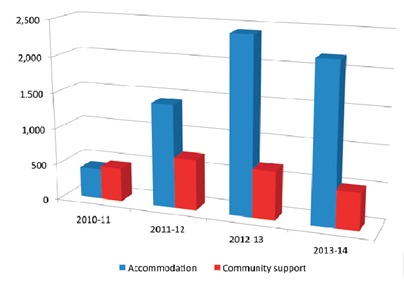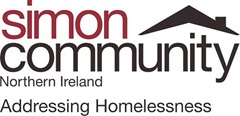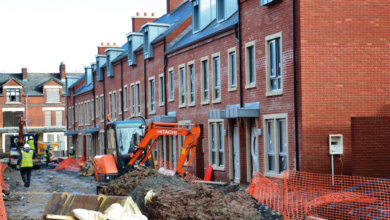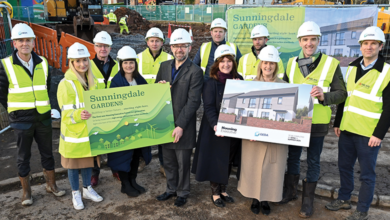Homelessness in Northern Ireland
 Jim Dennison, Chief Executive of Simon Community Northern Ireland, poses the question
Jim Dennison, Chief Executive of Simon Community Northern Ireland, poses the question
“Is homelessness too difficult a problem to solve?”
Simon Community is a leading charity in Northern Ireland committed to creating a society where homelessness is ended and is unacceptable. From our beginnings in 1971, we have been providing vital services such as emergency accommodation, advice and support for individuals and families who are homeless or at risk of becoming homeless. In the past 40 years – and particularly over the last five – we have seen the causes and effects of homelessness change to become more varied and complex in nature.
We are economically more worse off in Northern Ireland now than we’ve been for a long time. Low income, poverty, financial crisis and debt are making significant contributions to the creation of homelessness. Home repossessions and evictions continue to rise. There is an acute lack of affordable housing. In addition, we are seeing more and more of our clients showing complex support needs.
Everyone’s journey into and through homelessness is individual and personal to them but over-arching trends are useful in describing the new face of homelessness. Traditionally, the main cause of homelessness is family breakdown and disputes. While that remains the case, we are seeing other factors coming to the fore. In 2012-2013, Simon Community statistics showed that the main reason for homelessness was being asked to leave by family due to addiction issues, damaging behaviours etc. (45 per cent). Others included: relationship breakdown; leaving an institutionalised environment (care or prison) and domestic violence. These pathways can then manifest in the client group as mental ill-health, poor physical health, difficulties accessing welfare benefits, poor understanding of systems and socially unacceptable behaviours due to a disrupted education and a range of experiences likely to have impacted detrimentally on their psychological and emotional well-being (abuse, unsettled childhood, conflict and separation from family). So, in recent years, we have seen and continue to see the causes and effects of homelessness becoming increasingly complex and relating to wider public policy, economic and social trends, and personal circumstances.
Worryingly, a not insignificant amount of the general public still equate homelessness or being homeless with rough sleeping. As a consequence, the fewer people we see rough sleeping, the less we think that homelessness is a problem. That couldn’t be further from the truth as referral figures to Simon Community continue to rise. Homelessness isn’t just about rooflessness, although that is one aspect of it. Key agencies such as Northern Ireland Housing Executive (NIHE) and European Federation of National Organisations working with the Homeless (FEANTSA) acknowledge that homelessness is about having to live in insecure housing, inadequate housing, or in a houseless situation. This more broad definition means that many of those affected by homelessness go undetected.
Whilst we know that 4,832 households presented as homeless to the NIHE during the July to September 2013 period (a 5 per cent increase on the previous quarter), we also know that this is not the full extent of the problem. However, in its most recent Housing Research Bulletin, the NIHE concludes: “Not all homeless households require temporary accommodation: some people are able to make their own arrangements with family or friends. Nevertheless, the number of people requiring temporary accommodation exceeds the supply of accommodation in Supporting People-funded schemes by a considerable margin.”
In October 2013, a snapshot of the 385 client bedspaces in Simon Community showed that 60 per cent of clients had complex needs (and almost 50 per cent of Simon Community clients were under the age of 25 at this time). This calculation uses a broad definition of complex needs and references issues such as “learning disability, mental health problems and substance abuse” as key indicators. This client group is recognised as being disproportionately failed by or resistant to existing supportive interventions and is at greater risk of repeat homelessness.
The dominant approach to accommodation for homeless people in Northern Ireland is linear in nature. It essentially entails ‘progressing’ homeless people through a supported pathway from traditional hostel accommodation to community supported accommodation and then to independent living back in their community. The much referenced ‘Housing First’ model by-passes temporary accommodation and places vulnerable homeless people directly into independent housing with local bespoke services.
If appropriate and affordable housing stock was available, the Housing First approach may be a sustainable solution for homeless individuals and families with low or medium support needs. However, a ‘Housing First Only’ approach could serve to further disenfranchise and disadvantage the complex needs client group.
A considerable amount of very good work has been done to address homelessness, particularly that funded by the Supporting People programme, operated by the Department for Social Development (DSD) and co-ordinated by the NIHE. However, there is much more to do.
We believe that:
• there is a need to devise, implement and fund long term accommodation and support solutions for homeless individuals;
• providing the appropriate housing options for the growing complex needs group relies on a full understanding of the causes of homelessness and how these manifest in behaviours, abilities and support needs – this requires a programme of education and wider community engagement;
• the significant relationship between the two issues of homelessness and complex needs must be acknowledged and built into service planning and delivery to ensure that the welfare and support needs of people with complex needs are aligned to their housing need;
• the inherent link between complex needs and homelessness is multi-faceted and requires an integrated approach from a number of agencies such as health, criminal justice, education, social care and employment;
• there needs to be a clear connection between (and resourcing of) existing strategies focusing on homelessness and supported by strategic and programmatic imperatives such as the NIHE Homelessness Strategy 2012-2017, the DSD Housing Strategy, the Supporting People Strategy and the Programme for Government 2011-2015;
• in essence, what we really need is one integrated, interagency homelessness strategy for Northern Ireland with dedicated funding as a critical first step (this should include connection and coordination of homelessness services, phousing options services, and the allocation processes for both temporary and permanent accommodation).
In answer to the question: “Is it too difficult a problem to solve?” we believe that the answer is: “No, it isn’t.” With the proper thought, funding, commitment and drive, we can achieve the vision of ending homelessness in Northern Ireland.
The Simon Community offers a variety of support services for those who are homeless or at risk of becoming homeless. For more information, please contact our 24/7 freephone helpline on 0800 171 2222 or by visiting www.simoncommunity.org







